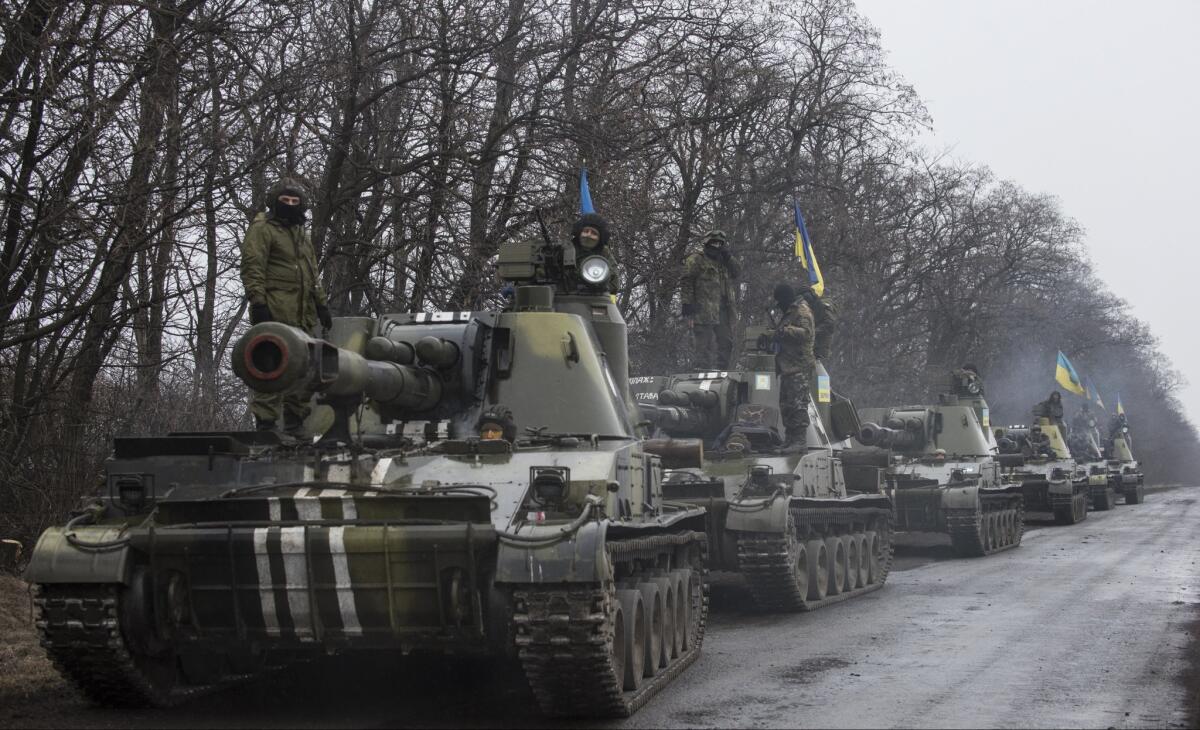Russia denounces arrival of U.S. military trainers in Ukraine

- Share via
Reporting from Moscow — Russia’s Foreign Ministry on Thursday called the arrival of U.S. military trainers in western Ukraine a “provocation” and warned Ukrainians that they should rethink the consequences of hosting Western forces.
“U.S.-Ukrainian military drills in the western Ukrainian Lviv region threaten Russia’s security,” ministry spokesman Alexander Lukashevich said in a statement carried by the official Tass news agency.
A top NATO commander lambasted Russia in turn in a fashion reminiscent of the Cold War, a reflection of the crisis that now afflicts East-West relations after two decades of hope for an end to the bipolar world.
At an event in Riga, the Latvian capital, NATO Deputy Secretary-General Alexander Vershbow called Russia “angry” and “revisionist,” accusing the Kremlin of trying to reduce Ukraine to a failed state and suppress dissent in Russia.
Former Russian Deputy Prime Minister Boris Y. Nemtsov was gunned down across from Red Square last week in the most brazen attack on a Kremlin critic in a decade replete with political assassinations.
Deputy Defense Minister Anatoly Antonov joined in the accusations that flew Thursday, saying the North Atlantic Treaty Organization has cast his nation as a dangerous enemy and threatened its national security by planning to create alliance outposts on Russian borders with the Baltic states and Poland. Antonov called NATO comments about a threat from Russia against Eastern Europe “mad” and “paranoid.”
Russian officials and state-run news media sounded alarms over the arrival of the trainers, an element of U.S. defense aid the Pentagon announced early this year. As many as 300 American troops are to be sent to the Lviv region on Ukraine’s western border to train Ukrainian soldiers.
Lukashevich said that the U.S. forces intended to teach Ukrainian soldiers “how to use overseas military equipment” and that policymakers in Washington are considering whether to send weapons to Ukraine.
“It is evident that they are not trying to bring peace to the country,” Lukashevich said. “Kiev authorities and all the Ukrainian people should think about the possible consequences of such steps.”
The statements appeared to herald a Russian backlash that probably will put further pressure on an already shaky cease-fire in place after a Feb. 12 agreement in Minsk, the capital of Belarus.
The U.S.-Russian relationship, at its lowest point since the end of the Cold War, could be significantly further damaged if “the citizens of Donbas start being killed with the use of the U.S. weapons,” Lukashevich said.
Donbas is the industrial and mining region that spans the Don River basin near the Ukrainian-Russian border where Moscow-backed separatists have seized territory and proclaimed autonomous “people’s republics.”
No decision has been made in Washington on sending lethal aid to Ukraine. The move was discussed before the Minsk peace plan, which at least temporarily put off the divisive issue.
About 6,000 people have died since fighting broke out 11 months ago after Russia’s seizure and annexation of Ukraine’s Crimea territory.
Russian President Vladimir Putin has cast last year’s ouster of Kremlin-allied Ukrainian President Viktor Yanukovich as a U.S.-inspired coup d’etat that brought pro-Europe and pro-NATO officials to power in Ukrainian elections last year. Putin has vehemently opposed NATO membership for Ukraine and lashed out at Western military support of any kind for his nation’s southwestern neighbor.
Ukraine, which proclaimed independence from the Soviet Union in 1991 as the communist-ruled federation was collapsing, had pledged to remain nonaligned, and in any case would need years to carry out reforms and assimilation of its armed forces with those of NATO before it could be inducted into the Western defense alliance.
But since the Russian-backed insurgency began ripping Ukraine apart, Kiev authorities have renounced the nonalignment pledge and set their course for eventual NATO membership.
Lukashevich also lashed out over NATO warships engaged in exercises in the Black Sea, which Russia regards as a strategic outlet to the Mediterranean that is within Moscow’s traditional sphere of influence.
“Talking about the ships that entered [the Black Sea], I would call it a very worrisome signal, a provocative idea which does not add up to stability and confidence that the peace process in Ukraine will be stepped up,” Lukashevich said. “Any military presence in the proximity of a regional conflict is always a very dangerous maneuver which can lead to different unpleasant consequences.”
Russian media portrayed the U.S. and NATO activities around Ukraine as American interference in regional security affairs.
“Boots on the Ground: U.S. Military Instructors Arrive in Ukraine,” the RIA Novosti news agency, also known as Sputnik, proclaimed in the lead story on its website Thursday. The report appeared under a photo showing several camouflage-clad U.S. soldiers standing in formation.
It said the United States “has been providing Kiev with economic and nonlethal military support since the beginning of a military operation against independence fighters in Ukraine’s eastern regions of Donetsk and Luhansk last April.”
Follow @cjwilliamslat for the latest international news 24/7
ALSO:
Western unity over Ukraine-Russia crisis begins to show cracks
Hands-off strategy in Ukraine spurs critics of Obama’s foreign policy
Slain Kremlin critic Boris Nemtsov buried as thousands pay final respects
More to Read
Sign up for Essential California
The most important California stories and recommendations in your inbox every morning.
You may occasionally receive promotional content from the Los Angeles Times.














